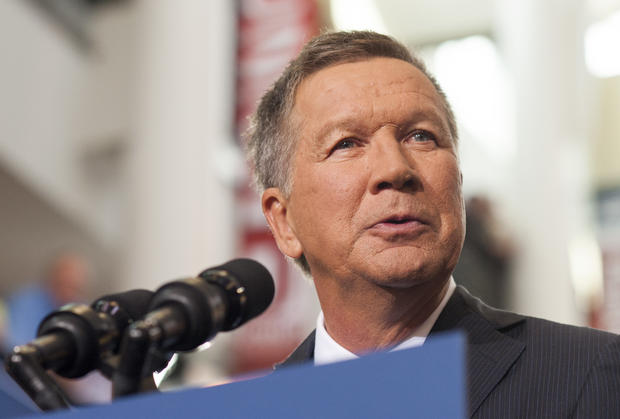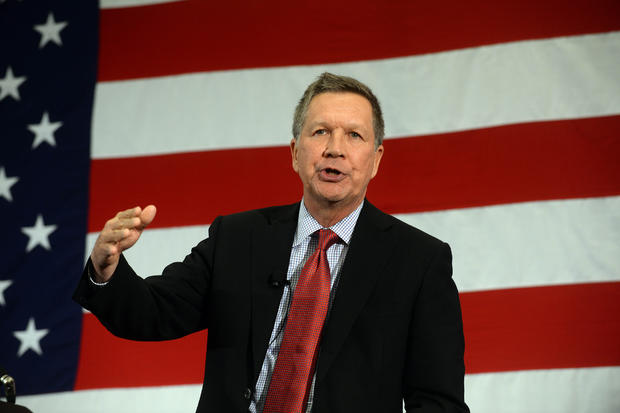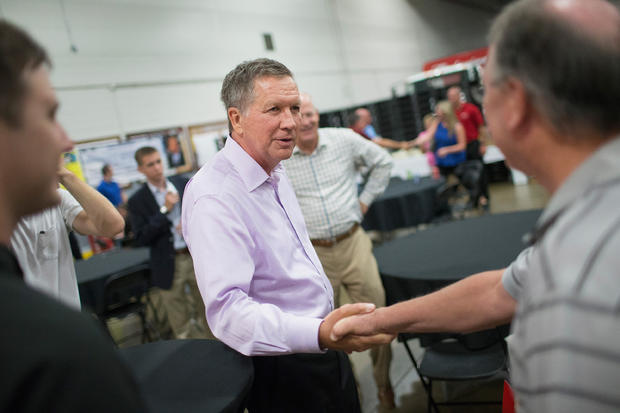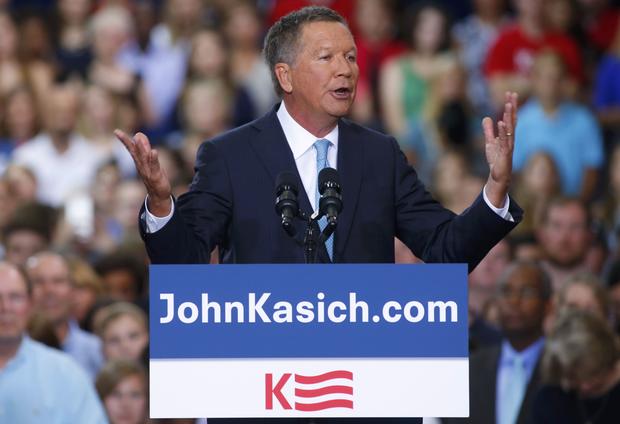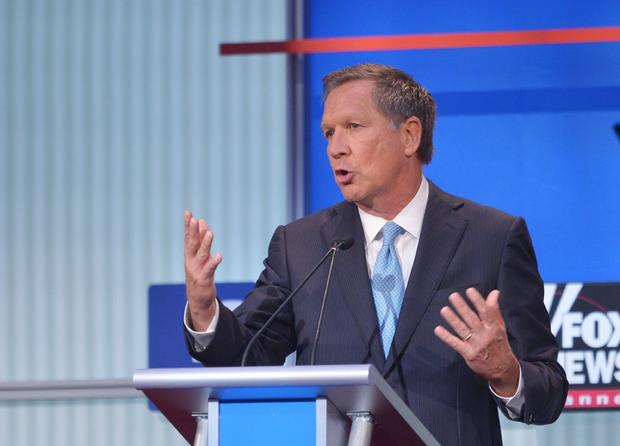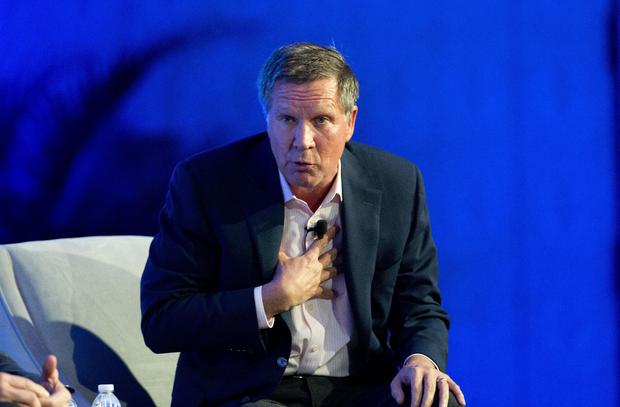John Kasich: What does he stand for?
Is Ohio Gov. John Kasich really a moderate Republican, or does he just occasionally play one on TV?
After finishing a strong second in New Hampshire, Kasich has breathed new life into his bid to position himself as the "establishment" Republican candidate in a field thus far dominated by Donald Trump and Ted Cruz.
A former congressman who left office in 2001 to enter the business and media arenas, Kasich reentered politics with a successful gubernatorial run in 2010, and he was reelected by a wide margin in 2014.
With that diverse background, Kasich would certainly bring a wealth of experience with him to the White House, should he win. But what would he use that experience to do as president?
Kasich was considered a reliably conservative legislator during the 1990s. He helped negotiate several balanced budgets as the chairman of the House Budget Committee. He carved a fairly hawkish profile on the Armed Services Committee. He helped lead the push for welfare reform in 1996. And he voted to impeach then-President Bill Clinton in 1998.
As governor, though, Kasich has hewed more closely to the middle of the road. He's won plaudits from conservatives for his tax and education reforms, but he angered some Ohio Republicans when he decided to expand Medicaid under the Affordable Care Act, better known as Obamacare. He's also urged Republicans to strike a more inclusive tone on issues like immigration and same-sex marriage.
Kasich has leaned on his Christian faith to explain his approach to politics.
"Put yourself in somebody else's shoes. Put yourself in the shoes of a mother and a father of an adult child that is struggling...Understand that poverty is real," he told reporters in 2013, as the Ohio legislature was mulling his push to expand Medicaid. "When you die and get to the meeting with St. Peter, he's probably not going to ask you much about what you did about keeping government small. But he is going to ask you what you did for the poor. You better have a good answer."
Here's a look at what John Kasich stands for.
CBS News Political Reporter Jake Miller contributed to this story.
Education
Like nearly all 2016 Republican candidates, Kasich champions the expansion of charter schools, more school vouchers that allow state residents to attend the school of their choice, even if it is a private or religious school, and the increased use of testing to evaluate teachers' success.
But he does stand out from the crowd for his support of the Common Core educational standards. Some Republicans say it represents federal overreach into the education system, but Kasich said Ohio districts still have plenty of control over what they teach.
"I've asked the Republican governors who have complained about this to tell me where I'm wrong, and guess what, silence," he said on "Fox News Sunday" in January.
The latest budget Kasich signed in June cut more than $84 million from public schools. He argued that the funds he eliminated with his line-item veto would have gone predominantly to wealthier school districts that could raise local taxes. During his tenure, traditional public school funding has gone down while funds going to charter schools increased.
Early in his gubernatorial tenure, Kasich championed legislation that would have limited the collective bargaining rights of 350,000 public workers, including teachers, police and firefighters. Voters rejected a referendum on the law.
Immigration
In an interview on CBS' "Face the Nation," Kasich outlined how he would tackle immigration as president.
"Finish the wall and make it clear. Anybody that comes over that wall once we've done it, you're going back. And to the 12 million that are here, you know, legalize them but make sure we don't have any of the criminal element here. And have a guest worker program. I think the country can unite around that," he said.
He has said that the immigrants who live in the U.S. illegally "contribute a lot" to the U.S., and while he would not prefer to make citizenship an option, he believes it should be on the table to help restart negotiations on the issue.
Kasich once supported a bill that would eliminate birthright citizenship - citizenship that is automatically granted to babies born in the U.S., even if they are born to undocumented parents - but he has backed away from that position during his campaign, saying, "I don't think we need to go there."
Economy
As a congressman who rose to become the House Budget Committee chairman, Kasich wrote budgets that made deep cuts to federal spending. He was also instrumental in producing the 1997 Balanced Budget Act that was a result of years of budget wars between former President Clinton and the GOP-led Congress. He's remained a budget hawk and has created a nonprofit group called Balanced Budget Forever to advocate for adding a balanced budget amendment to the Constitution.
Kasich has one of the strongest economic records of the sitting governors competing for the 2016 Republican nomination, and he is quick to remind voters that he turned an economic deficit billions of dollars deep (estimates range from $6 billion to $8 billion) to a $2 billion surplus.
Kasich has slashed the personal income tax in Ohio - and pledged to phase it out entirely - but backed a slightly higher sales tax and increased taxes on things like cigarettes, the oil and gas produced by fracking, and some business revenues.
On the federal level, Kasich has talked about reducing the corporate tax rate and moving toward a flat tax system with a single rate and eliminating all exemptions. He hasn't released a detailed plan yet, but he has talked about wanting to spur further investment by businesses.
He said on "Face the Nation" that like the 2012 GOP candidates, he wouldn't trade a dollar in tax increases for $10 in spending cuts, because the government will always spend money if they have more.
He also opposes increasing the minimum wage.
Social issues
Kasich opposes abortion except in cases of rape, incest or danger to the life of the mother, and he took steps to limit abortion access in Ohio.
In 2013, he signed a bill into law that bans abortions after 20 weeks except where the mother's life is in danger. The state budget he signed into law that year also effectively cut off federal family-planning funds for Planned Parenthood clinics while allowing crisis pregnancy centers, which discourage women from seeking abortions, to receive federal money.
He did show reluctance about a bill from the Ohio legislature that could have banned abortions once a fetal heartbeat is detected, which often occurs at six weeks of pregnancy. He said he was worried about legal challenges to the bill.
As a U.S. congressman, he voted in favor of banning partial-birth abortion.
On the issue of same-sex marriage, Kasich says he believes that marriage is the union of a man and a woman, but that hasn't stopped him from attending the weddings of same-sex couples.
"I just went to a wedding of a friend of mine who happens to be gay. Because somebody doesn't think the way I do, doesn't mean that I can't care about them or can't love them," Kasich said at the first GOP debate.
After the Supreme Court ruled that same-sex marriage is a constitutional right earlier this year, Kasich said he disagreed with the definition of marriage, "but our nation's highest court has spoken and we must respect its decision."
Foreign policy
Kasich was best known in Congress for his role as House Budget Committee chairman, but he also served on the House Armed Services Committee for his entire 18 years in Washington. He likes to call himself a "cheap hawk" who would be able to handle the duel tasks of ensuring U.S. security and preventing a bloated Pentagon budget.
Perhaps the most famous example of Kasich's defense frugality on display was his crusade to discontinue the B-2 stealth bombers that cost taxpayers billions of dollars.
He opposes the nuclear deal with Iran, telling New Hampshire voters, "Sometimes you have to say no to a bad deal, period, end of story, exclamation point, that's it." He elaborated on his opposition in a radio interview with Hugh Hewitt a few weeks later, saying that Iran should be required to change its behavior before the U.S. agrees to negotiate with them. He also calls for a more automatic imposition of sanctions if Iran is caught cheating rather than subjecting it to a debate.
On the fight against the Islamic State of Iraq and Syria (ISIS), Kasich has taken one of the more hawkish positions by calling for U.S. ground troops to fight the group.
"It's either you're going to pay more now or a heck of a lot later," he told voters in New Hampshire earlier this summer. "This is something that has to be dealt with. Let's just do it. We can rally the support of the public for this."
That's not the only arena where he argues for more military action. He has been critical of the Obama administration for refusing to supply the Ukrainians with weapons to defend themselves against a Russian incursion and said that the U.S. should send an aircraft group to the South China Sea to "send...a little message" to the Chinese about building artificial islands in disputed waters.
Kasich said on CNN's "State of the Union" in August that he "would have never committed ourselves" to the war in Iraq - an issue he never had to vote on since he left Congress after the 2000 election. It's also not what he said about the Iraq war in 2002.
"We should go to war with Iraq. It's not likely that [Saddam] Hussein will give up his weapons. If he did he would be disgraced in the Arab world," Kasich said during a 2002 speech at The Ohio State University.
Kasich also said in the CNN interview that the U.S. should have left a base behind in 2011 when President Obama withdrew troops, and that he would have supported rebels in Syria working to overthrow Syrian dictator Bashar al-Assad.
Kasich will speak more extensively about his foreign policy vision on the campaign trail in South Carolina Monday.
